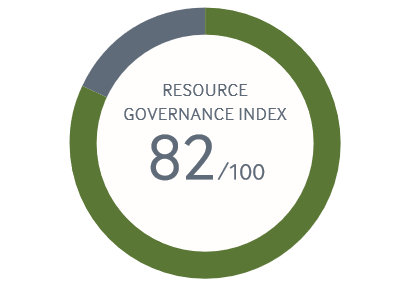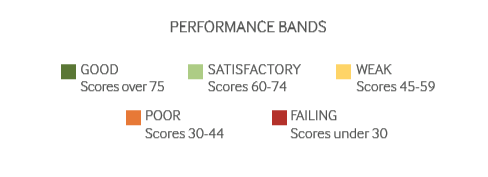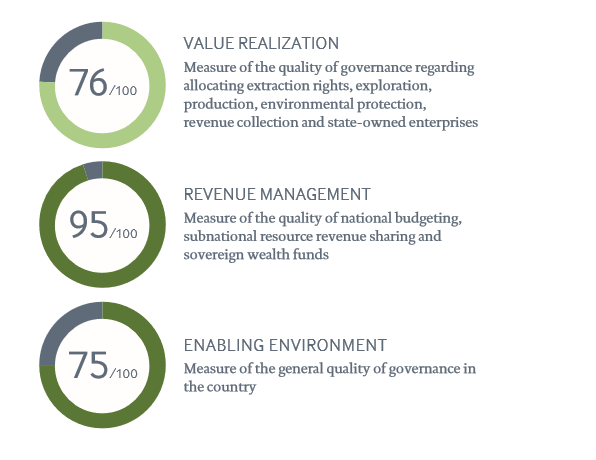
2021 Resource Governance Index: Senegal (Oil and Gas)
Français »
1. The Senegalese government:
5. The Court of Auditors: Make its annual reports, including the conclusions of the audit of the tax administration, available to the public on a regular and timely basis.
6. The Ministry of the Environment and Sustainable Development: Integrate into the texts the obligation for the Ministry to publish impact assessments and environmental and social management plans of extractive projects on an online platform.
7. The National Local Content Monitoring Committee (CNSCL): Disclose, in addition to the CNSCL’s annual reports, the baseline studies and impact assessment studies, and associated strategy documents of the local content policy.
The 2021 RGI assesses how 18 resource-rich countries govern their oil, gas and mineral wealth. The index composite score is made up of three components. Two measure key characteristics of the extractives sector – value realization and revenue management – and a third captures the broader context of governance — the enabling environment. These three overarching dimensions of governance consist of 14 subcomponents, which comprise 51 indicators, which are calculated by aggregating 136 questions. For more information on the index and how it was constructed, review the RGI Method Paper.
Still in the development phase and assessed for the first time in the 2021 Resource Governance Index (RGI), Senegal’s hydrocarbon sector scored 82 points out of 100. This score, which places the sector in the “good” (highest) performance band of the RGI, results from good rules and practices in each of the index’s three components: value realization (76 points), revenue management (95) and enabling environment (75).
Key messages:
- The value realization and revenue management scores are particularly high because the legal framework and the main projects in the sector are still in the development phase.
- The overall good score for the oil and gas sector in Senegal is also due to the country’s good overall enabling environment.
- Transparency and accountability mechanisms regarding the tax system, production, payments, budget management and debt are well integrated into the country’s rules and practices.
- Rules and practices relating to financial flows between the state and state-owned company PETROSEN are relatively clear, pending the law on the management of hydrocarbon revenues, but there is room for improvement in the transparency rules relating to title allocation.
- Scores of both the hydrocarbon sector and the mining sector (assessed in another profile) are in the RGI’s highest performance band. However, the hydrocarbon sector performs better because it is still in its infancy and many of the RGI indicators are not applicable.
1. The Senegalese government:
- Require employees of state and public companies to make public their holdings in companies operating in the hydrocarbon sector; require the publication of information on the beneficial owners of oil and gas titles; and disclose this information on all titles.
- Mandate legislative review and disclosure of PETROSEN’s annual reports and accounts; and consider the establishment of a board of directors of PETROSEN that is independent of the state.
- Disclose its annual reports containing audited accounts.
- Publish the expenditures of its subsidiaries and joint operations on a project-by-project basis.
- Publish a code of conduct on its website.
- Mandate regular disclosure of the list of applicants for oil and gas titles, as set out in requirement 2.2 of the 2019 EITI Standard, and consider instituting an appeals mechanism for applicants.
- Publish all contracts and agreements between the state or state-owned company and oil and gas companies, including loan and grant agreements.
5. The Court of Auditors: Make its annual reports, including the conclusions of the audit of the tax administration, available to the public on a regular and timely basis.
6. The Ministry of the Environment and Sustainable Development: Integrate into the texts the obligation for the Ministry to publish impact assessments and environmental and social management plans of extractive projects on an online platform.
7. The National Local Content Monitoring Committee (CNSCL): Disclose, in addition to the CNSCL’s annual reports, the baseline studies and impact assessment studies, and associated strategy documents of the local content policy.
The 2021 RGI assesses how 18 resource-rich countries govern their oil, gas and mineral wealth. The index composite score is made up of three components. Two measure key characteristics of the extractives sector – value realization and revenue management – and a third captures the broader context of governance — the enabling environment. These three overarching dimensions of governance consist of 14 subcomponents, which comprise 51 indicators, which are calculated by aggregating 136 questions. For more information on the index and how it was constructed, review the RGI Method Paper.


